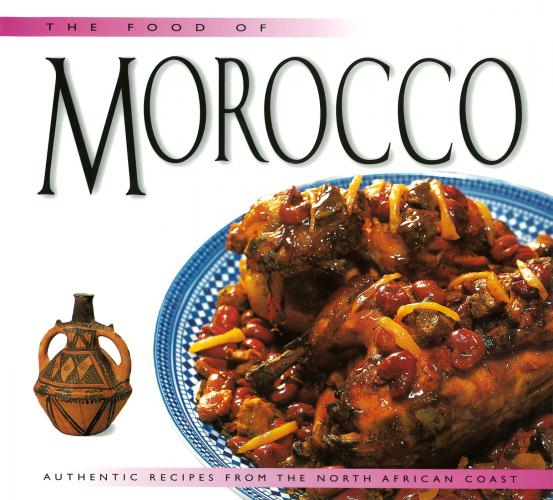THE FOOD OF
MOROCCO
Authentic Recipes from the North African Coast
Recipes and text by Fatema Hal
Photography by Jean-François Hamon and Bruno Barbey
Styling by Daniele Schnapp Contents
Published by Periplus Editions with editorial offices at 1364 Innovation Drive, North Clarendon, VT 05759 U.S.A. and 61 Tai Seng Avenue, #02-12 Singapore 534167.
Copyright © 2002 Periplus Editions (HK) Ltd.
All rights reserved.
First Edition
ISBN: 962-593-992-X
ISBN: 978-1-4629-1642-9 (ebook)
Library of Congress
Control Number: 2001096484
Distributed by
North America, Latin America & Europe
Tuttle Publishing
364 Innovation Drive
North Clarendon, VT 05759-9436
Tel: (802) 773-8930
Fax: (802) 773-6993
Email:[email protected] www.tuttlepublishing.com
Japan
Tuttle Publishing
Yaekari Building, 3F
5-4-12 Osaki, Shinagawa-ku
Tokyo 141-0032, Japan
Tel: (03) 5437-0171
Fax: (03) 5437-0755
Email: [email protected]
Asia Pacific
Berkeley Books Pte. Ltd.
61 Tai Seng Avenue, #02-12
Singapore 534167
Tel: (65) 6280-1330
Fax: (65) 6280-6290
Email: [email protected] www.periplus.com
Printed in Singapore
10 09 08 07 06 05 7 6 5 4 3 2
Publisher: Eric Oey
Associate Publisher: Christina Ong
Editors: Philip Tatham and Jocelyn Lau
Translator: Vincent Vichit-Vadakan
Production: Violet Wong and Chan Sow Yun
Photo credits
All food and location photography by Jean-François Hamon Additional photos by La Maison Arabe (Thierry Laureut), p. 8; Magnum Photos (Bruno Barbey), pp. 2, 6-7, 10, 12, 14-15, 17, 19-21, 24-25, 26; and Valerie Millet, p. 22.
Acknowledgments
The publisher wishes to thank the following for their generous assistance: Mr Ho Cheow Teck, Honorary Consul, Consulate of the Kingdom of Morocco, Singapore; Björn Conerding’s, Ursula Haldimann, and Enija Luna of Riad Enija; Mohamed Harda (hôtel Le Littoral), N’guyer Hj Mustapha B. Hj Omar (Marrakesh), Liwan, Siècle, Médina, Terre de Sable, Raynaud, Christofle, Baya, Mokuba, Colline des Potiers, Fée d’Herbe; Monette Aline, Stephanie Bertrand, Sandrine Duvillier, Joël Puentes, Fabrizio Ruspoli (La Maison Arabe), and Samual Rodany.
The valley of Tinerhir, east of the High Atlas Mountains.
Contents
PART ONE: FOOD IN MOROCCO
Introduction
The Riches of a Generous Past
Women and Dadas
Grand Imperial Cuisine
Food and Religion
Moroccan Hospitality
All Roads Lead to the Souk
PART TWO: COOKING IN MOROCCO
The Moroccan Kitchen
Cooking Methods
Moroccan Ingredients
PART THREE: THE RECIPES
Soup, Salads, and Breads
Meat
Poultry and Game
Fish and Seafood
Vegetables
Desserts
Drinks
Index
An impressive spread of tasty Moroccan snacks and appetizers.
Part One: Food in Morocco
Moroccan cuisine has been nurtured by centuries of Mediterranean influence
The history of Morocco has always been closely intertwined with the history of the Mediterranean. As a veritable crossroads of civilizations—an asylum for the Andalousian Jews and Arabs who were chased out of the kingdom of Grenada at the end of the 15th century; later a French Protectorate until its independence in 1956—Morocco offers an exceptional example of generosity and harmony. This multifaceted country reflects diverse regional, ethnic, and social influences, all of which left their mark on its past. It is this variety that gives Moroccan cuisine its unparalleled reputation. Moroccan cuisine is considered to be one the finest in the world and some of its most celebrated dishes have justly taken their place among the culinary classics of the world.
Porters from Telouet carrying couscous and bread to a diffa (banquet).
The “Isle of the Sunset,” Djerirat-al-Maghrib as the first Arab geographers named the land that would become Morocco, offers the traveler very diverse landscapes. First, there is the Atlantic Ocean lapping the shores in the west; then there are the Atlas and Rif Mountains that enclose a vast amphitheater reaching from the southwest
